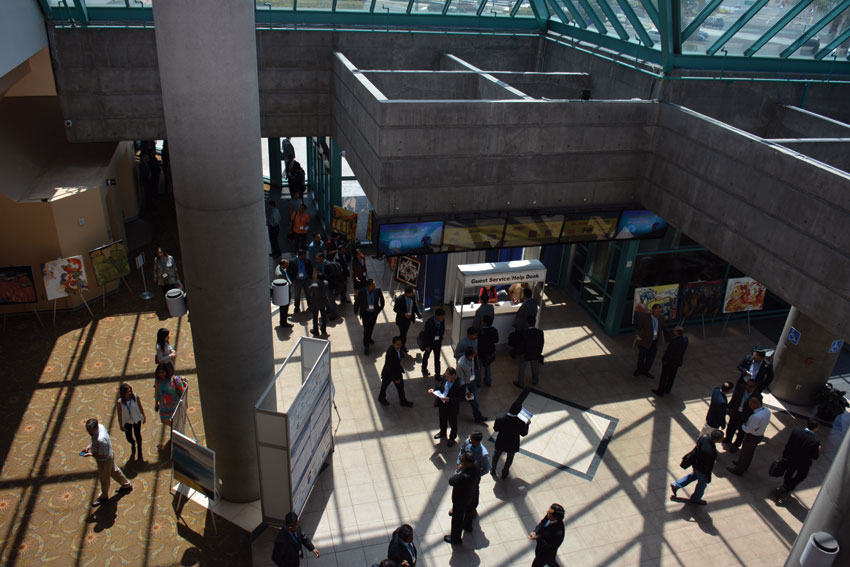THE HUB OF TECH ACTION
A view of attendees flocking the registration booths, eager to get up to speed with the latest and greatest in the Silicon Valley information, technology, entrepreneurship scene at #TiEcon 2015, held May 15-16 at the Santa Clara Convention Center in Santa Clara, Calif. Amar D. Gupta | Siliconeer
The Indus Entrepreneurs (#TiE) is now an important presence in many countries, encouraging innovation, business, technology and a great deal more through annual TiEcon conventions. But it has to be noted that TiE started in Silicon Valley (#TiESV), California and that the convention held here still remains the largest annual event of its kind in the world. The TiE Silicon Valley Chapter has been called the “Mother Ship” of South Asian entrepreneurship. It is from here that the mainly Indian (many graduates of IIT campuses) and some Pakistani technologists ventured out of the ranks of being mere employees and stepped into the world of business to found their own companies, to become a source of strength to others who followed in their footsteps. Today TiE is about all kinds’ business entrepreneurship and is not restricted to technology related to computers alone, writes Ras H. Siddiqui.
University of California President Janet Napolitano is locked in a battle with California Gov. Jerry Brown and the state legislature over restoring funding to the University, cut during the recession. In a candid interview with Sandy Close of New America Media, Janet Napolitano shares her vision for the future of higher education in California. She talked about challenges, measures and goals of the UC system. Napolitano was talking to various ethnic media, including Siliconeer, at a conference in her office in Oakland, May 27. Excerpts from the interview are presented below.
India has a new avatar. It is no longer just a back-office for software development by a pool of talented engineers or a hub for business processing outsourcing. India is fast becoming the darling for global investors, as hot new startups spring up across the nation.
Market conditions are now ripe in India for start-ups. The middle-class has rapidly expanded, smartphone usage is cheap and ubiquitous, the educated masses are hooked to the Internet, and the population is young, writes Vasudha Badri-Paul.
Armed with the unthinkable agenda of establishing harmonious relations with the immediate powerful neighbor, Indian Prime Minister Narendra Modi set foot on Xian, the capital of Shaanxi Province in northwest China, on May 14. The three-day maiden trip, a part of his three-nation tour (China, Mongolia and South Korea), was nothing short of establishing India’s credentials in conducting business with the world and of which China forms an integral chapter, writes Priyanka Bhardwaj.
More than 545,000 tech jobs remain vacant in the U.S. which is having a deep impact on Silicon Valley-based firms, American IT industry has said while arguing in favor of raising the cap on H-1B visas to attract the brightest minds from across the globe, writes Lalit K. Jha.
Modi slogs and he makes sure others under him do too during holidays and weekends. Such is the work pressure that some bureaucrats, usually inclined towards honing golfing skills at Delhi Golf Club, have reportedly installed beds in their office. This can only be good for the country, writes Siddharth Srivastava.


